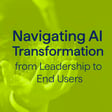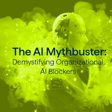Become a Creator today!Start creating today - Share your story with the world!
Start for free
00:00:00
00:00:01

Transforming Manufacturing: Keystone Industries' Journey with Alithya and Microsoft D365
In this episode of "Manufacturing Minds," we are joined by CJ Daas from Keystone Industries to explore Keystone's transformative use of Microsoft D365. They discuss how the integration of this advanced ERP system has streamlined operations, enhanced decision-making, and driven sustainability. Learn about the challenges Keystone faced, the solutions implemented, and practical tips for manufacturers aiming to optimize performance through technological advancements.
Discover the transformative role of AI in manufacturing on our new landing page, The Power of AI in Manufacturing | Alithya, brought to you by Alithya, proud sponsor of the podcast. Explore expert insights and innovative strategies that are reshaping the industry’s future.
Transcript
Introduction to the Episode
00:00:08
Speaker
Welcome to this special episode of the Manufacturing Minds podcast, where we explore the intersection of technology and industry to drive business success. Today, we're thrilled to be joined by Steve Reed, our VP of Sales, and we're also joined by a special guest from Keystone, a leader in manufacturing.
Keystone's Dynamics 365 Journey
00:00:25
Speaker
joining us to share their journey through the implementation of Dynamics 365 Finance and Operations. CJ is Keystone's Chief Information Officer and he'll be sharing with us first-hand about the challenges Keystone faced, their decision-making process and why they chose Alithia as their trusted partner for this transformative project.
00:00:46
Speaker
Join us as we dive into the impact this change has had on Keystone's operations, lessons learned, and their exciting vision for the future. Let's get started.
Keystone's Global Operations
00:01:01
Speaker
So CJ, welcome. We're really glad to have you today. ah Tell us just a little bit about about Keystone, what what Keystone does, and and a little bit about your background. Good afternoon, Steve. Thank you for having me.
00:01:15
Speaker
ah Let's talk about Keystone first. We are an R and&D and a manufacturing company. R and&D meaning research and development of chemicals. and That is our forte. and Then of course, manufacturing of those chemicals. and These chemicals are manufactured for dental industry, for cosmetics, for pharmaceutical companies. Our headquarters is in New Jersey.
00:01:43
Speaker
We have five facilities here in New Jersey and in Pennsylvania area. We have our operations and plans in Netherlands, in Germany, and in France. Then we have our distribution centers and packaging in China. We also have another warehouse in the West Coast in LA. So this is roughly what we are. As far as I'm concerned, I'm the CIO.
00:02:12
Speaker
And we are a mid-sized company. So as you would expect for any mid-sized company, a CIO has to wear many hats. I am my business title CIO, but then i I'm also the chief security officer, chief digital officer, chief data officer. There is no CTO. I'm the CTO as well, and which is expected of me. our Responsibilities, you know if you see from upstream and know project management,
00:02:42
Speaker
software development, then data and analytics, and the backend infrastructure security. So this is the usual responsibilities of any CIO. But beside that, strategy, budget management, vendor management, people management, and the whole line yards, Steve. So that's what I do. you're You're a man of many hats. Yeah, it has become a habit, a second nature.
00:03:12
Speaker
For all the companies that I have worked, I never had a CTO, for example. But I have a technology background. So playing the CTO role is not that difficult for me, given my background. But I have had help, obviously. I should not take all the credits. I have had very strong um enterprise architects who play the pseudo CTO role and helped me out. That's great. So tell us a little bit about what led ah Keystone to embark on on implementing D365.
Choosing Dynamics 365 over Competitors
00:03:48
Speaker
So we all along had AX 2009, but that was so obsolete ah that it was becoming a bad bottleneck for business.
00:04:00
Speaker
So ah time came to upgrade. So we looked into various products. But having AX 2009, I think our next obvious step was 365. We did look into SAP. We looked looked into NetSuite and some of the other products. Now SAP, as you know, is a huge product, more suited for bigger companies. And it's expensive.
00:04:29
Speaker
NetSuite is a fine product, um but we we are a kind of a Microsoft shop, so to say, meaning we have on-prem SQL servers, we have Windows servers, we have Microsoft Exchange for email, and so on and so forth. And D65 is one of the leaders in the market anyways. So we did some due diligence,
00:04:57
Speaker
on other companies, other products, but Microsoft D65 was our our obvious choice. Good. And as you you mentioned before about the but some of the different roles you play, you know not not only from a CIO, but also from security, things like that. How how does that, I guess, as you look at maybe even from a today standpoint, as you look at how D365 and Microsoft, how does that dovetail into as you look at your overall security footprint? Does does that do that? I guess, does it go go hand in hand with the other things you're doing with Microsoft? It does. For example, I mentioned on-prem servers. Those are legacy servers. People are going to cloud, 100% cloud, and I strongly believe we should be 100% cloud.
00:05:49
Speaker
we should not have anything on-prem, because that is not what do we do for business. We should concentrate on R and&D and manufacturing. That is our business. Rest are all necessary evils. So coming to the 65, it's 100% cloud solution. So the security is managed by Microsoft. Now, we we are also responsible for security, obviously,
00:06:19
Speaker
but our responsibility diminishes when we have a SaaS product, let's say, a platform and a service product. So this 65, I think, was a fine choice for us because it is hosted by them, it is managed by them, and it's much less hair headache when it comes to security.
Selecting Alithia as Partner
00:06:40
Speaker
So talk a little bit about the the the process, choosing choosing an implementation partner.
00:06:46
Speaker
um you decided on on Olithia, do just that that connection, what what you know why Olithia? And then again, kind of that criteria, what were you looking at for in an implementation partner? We did not use LED at that point in time. We thought the LED wasn't mature enough then. But since then, LED has come a long way. I know, I recall, LED emerged with edge water, then with Traverse and I think another company and so on so forth. It grew and it's a very different company today. Coming to this company, we did again a thorough due diligence into various companies and the usual culprits emerged like Avanade, for example, right? One of your competitors. Very solid company, very mature company.
00:07:44
Speaker
and then Elethea, of course, and I looked into other tier two companies, let's say, I forget the name, but one was Dynamic Square, Waypath Consulting, and so on, but they did not have the depth. So really, it left at the end, I had Elethea and Avenat. Avenat was very expensive, I used them before.
00:08:06
Speaker
So I looked into number one criteria was expertise. What kind of expertise this company has? That's my number one criteria because we need a partner who could educate us, who could set up the system, who could help us in the journey, who could guide us with best practices. The depth is very important because we do not have the depth ourselves when it comes to year being particular.
00:08:31
Speaker
With depth and the knowledge comes the maturity of the processes. I thought Alithya had very strong, mature processes. Then his past history and experience in manufacturing and other industry, but particularly in manufacturing. I think Alithya has a solid record there. But end of the day, we want a true partner who can give us confidence. See leader, a leader, we follow a leader because that leader has a vision and gives us the confidence and therefore we follow leader. So I want leader like that. And when I draw a Venn diagram with all these criteria, expertise, maturity, past exp experience, competitive pricing, I think Alithya was at the center, meaning it checked all the boxes for me. And that's why we chose Alithya.
00:09:29
Speaker
This episode is brought to you by Alythia, the ERP experts with deep focus on manufacturing. With one third of our clients in the manufacturing sector, Alythia has the experience and expertise to address the unique challenges of the industry.
00:09:43
Speaker
If you're looking to streamline operations, boost efficiency, and support growth, Alithia's team is here to guide you every step of the way. We offer comprehensive support for Microsoft Dynamics 365 Finance and Operations, customized to meet your business needs. Ready to transform your operations? Visit alithia.com to learn more.
Implementation Process Overview
00:10:08
Speaker
CJ, talk talk a little bit about the the implementation process just at a high level and how how that implementation, you know, for for a new ERP, how did that go? Implementation for me starts where first thing I need to do is to understand the current state. We did not know our own current state. So we asked Ellithia to come and draw the current state and then grab the future state for us.
00:10:38
Speaker
So visually I can understand here I am today and there I have to go tomorrow. So once I understand that, then after we sit down through the real hard work and what is called conference room pilots, basically those are nothing but sessions when you sit down and go through all the business rules, all the processes, map them, document them. That's why Alithya was most useful to us documented the processes, simplifying the business rules, because current state may have convoluted business processes. So simplify them. Now let's start implementing them, those processes. ah Another huge step was the data migration. As I said, we are in AX 2009.
00:11:28
Speaker
And from there, when you take a big leap to D65, these two are very different systems. All the both Microsoft, they are not same. It is not an upgrade per se. We are really going to a different system altogether. And so, this data migration was Ellithia's job. That we couldn't do. So Ellithia has folks who are really super-duper brain boxes, I will say. They somehow managed to do the data migration, which to me seemed impossible because the schemas are so different, the database schema. So that was done. And then finally, the testing. Testing has to be done exhaustively. So that took a while. And finally, the training of the people.
00:12:16
Speaker
Salithi helped us train our users. And there are other smaller details which I want to go through. But mapping the future state, documenting the business rules, simplifying them, training us in the new modules. There are so many new things in D65, advanced warehouse systems, price management.
00:12:38
Speaker
blah, blah, totally new to us. So Alithya has to teach us all that, data migration, testing, training. And then finally, a post-go life where all the problems surface and Alithya would hold our hands, walk us through this problem, resolve them. That was at a high level, the implementation process. Yeah, no, that's that's good. And um'm I'm curious, you know, and I bet I know the answer, but I'm going to ask the question anyway.
00:13:08
Speaker
going through that implementation, there were no surprises, correct? No no surprises. Well, some surprise started the first day when I think they give us some insights into our own current state. You know, that was eye-opener for us. And how efficient we can be in the new system. You know, the the rooms were improvements. How obsolete we were.
00:13:37
Speaker
How much opportunities are there to be efficient? Yeah. No surprises, as you said. Yeah. And that's, you know, that's true. We see that. And um and um I'm curious, again, taking taking a little bit of a guess here, I'm assuming this is not your first implementation. Is that true on on on most implementations that they're there're there're going to be surprises that that take place along the way?
00:14:02
Speaker
Yes, there'll be surprises. There'll be skeletons that we're not aware of. Customizations were done in AX 2009 unbeknownst to us due to whatever odd business reasons or obsolete business reasons. Things were done not valid anymore, but we are still doing those things because it has become a rule over the years. Nobody knows where the rule came from. So those were the surprises.
00:14:31
Speaker
and few other surprises were expected, I think, from my experience, I knew those things would happen. However much you prepare, some surprises do spring up. Yeah, and that's, it is, it's I think that's true in anything, and in and even the most prepared customer, they're there're going to be those the unexpected to come up.
Handling Unexpected Implementation Issues
00:14:56
Speaker
How did, I guess, as you as you think through that, how did Oletia assist you going through the implementation and I guess ah you know handling handing when surprises did come up, were they able to to help help address and and manage through that through through the surprises? Yes, Alithya has people, as I said, that truly knows the subject. These are not a group of people who have just studied or got trained and and then come on board. These people have lived and
00:15:29
Speaker
They're living and breathing the system, so they know. So when you go to Aletheia for help, they exactly understand what you're saying. It is not just solving a problem. They will guide us through, simplify, tell us, no, let's not do this. The root cause of the problem lies here. Let's resolve it at the root, and so on. So they'll guide us. That is what I want, a partner who will guide me and not necessarily be an order taker. I don't want to an order taker. Then there is not a partner. I want someone either equivalent to me or better than me potentially. And that's what Alita was. since you've Since you've been live on D365 across the company, have you seen and heard, I guess heard from the business users,
00:16:21
Speaker
benefits that that they've seen from D365 versus how you know what it was with AX-2009? Almost in every arena, we have seen improvements. Let's say, for example, capacity planning. We did not do any capacity capacity planning, D65. It was a big void, a gap in our whole process. It's hard to believe. Don't tell anybody else I said that, okay? But capacity planning was not done properly or not done at all.
00:16:50
Speaker
That leads to better inventory management. Our inventory management wasn't good. That leads to better scheduling. okay So these are huge improvements. Then we use advanced warehouse management. That was not there at all in 2009. We use scan guns to, for example, to automate the picking, okay which was manual before.
00:17:17
Speaker
We have various finance, AP and AR workflows, which are automated, as simple as you know sending the collection letters. Those were manual, now they're automated. So for this at a strategic level, capacity planning and so on and so forth, or a simple automation of a collection letter, all across the spectrum, we have seen improvements. That's great.
00:17:44
Speaker
as you As you look at the company today, and and again, this is somewhat of ah ah a technology question and also part business question, how how do you see, and I'll just jim generically AI, how do you see that playing a ah ah role in Keystone?
AI and Keystone's Future
00:18:05
Speaker
There are many areas that we are already exploring how AI will help. For example,
00:18:14
Speaker
I just got approval for using the um
00:18:21
Speaker
what you call Teams Premier, which is nothing but AI, which will help us generate certain financial reports for us, otherwise done manually. Now I failed to mention, by the way, Ellithia has set up the warehouses for us. So not only ERP, Ellithia did the all the data modeling, the data warehousing data lake, and Power BI as well. ah So here, the example that I'm taking now,
00:18:49
Speaker
It will be all automated. Today, the business users come to us. Can you generate this report for me? Or even if they know what to do, and there are engineering works that has to be done by us. So this AI they're going to implement, Power BI AI, ah users will go, I'm simplifying it, but almost Google-like. You ask the question, it will generate the report.
00:19:15
Speaker
So, this is ah perhaps not the best example, but we have many we have machines on the plans. IoT will play a big role. How do you collect the data and generate some intelligence out of it? I have already presented last year in my strategy four immediate use cases where we'll be using AI.
00:19:39
Speaker
so I think we are stepping into a a world wonderful world. We live in a very exciting time still. i I feel lucky. And as a CIO or any technology person, it is very exciting time to be in this era. What other initiatives do do you have you know next three years, five years?
Keystone's Future Plans
00:20:04
Speaker
what Just on the horizon, what do you see as being where where you need to go next?
00:20:09
Speaker
So from ERP perspective, let's start there. ah We have not migrated all our facilities to T65 yet. So I think we'll be working with Elithea soon again, once the budget gets approved. So that is on the cards. Then we have See, as as a technology person these days, we need to add value. So many of the things that we used to historically are commodity today. So they're all gone. They are really to be outsourced. So what do I do? you know Really, we take care of security. That is very core to any business. And then we integrate systems, integration, digitization, efficiency improvement. So if I to look at my roadmap,
00:21:01
Speaker
um These are all directly aligned with what I said earlier, R and&D and manufacturing. How is my job helping in R and&D, research and development, how my job is helping in manufacturing? ah So those boils down to integration systems, easy flow of data, efficiency improvements, automation, they're all about automation these days. So those are the things in the roadmap for next few years.
00:21:32
Speaker
That's exciting. You definitely have plenty to keep you busy. Oh, absolutely. Yes. Well, super CJ, thank you for your time today. It's been really good to hear about Keystone, hear what Keystone has has done and and what's on the what's on that future roadmap for you as well.
00:21:52
Speaker
Thank you for tuning into today's insightful discussion on the transformative power of technology and manufacturing. A special thanks to our guests for sharing their valuable experiences. Be sure to join us next time on the Manufacturing Minds podcast as we continue to uncover the strategies that drive industry success. Until then, keep innovating.



